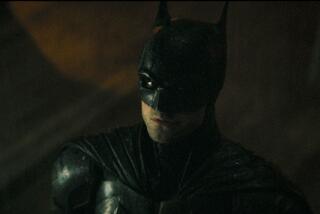Be Prepared for Murphy’s Law
- Share via
You just never know. That’s the principle behind “The Worst-Case Scenario Survival Handbook,” a book that is the basis for a TBS show premiering this week.
The series, scheduled for 13 hourlong episodes, tackles dangerous situations and shows viewers how to get out of them safely.
You never know, for example, when you might have to jump out of a moving car. Or knock down a door. Or jump off a building.
“For instance, I’m driving down the road right now, and someone could cross the line into my lane,” said Mike Rowe, 40, the show’s host, in a cell phone interview. “We don’t dwell on such facts, but it makes sense to look down the road and keep your guard up.”
According to Rowe, the show--like the book--is a combination of the Boy Scout motto (Be Prepared) and Murphy’s Law (Anything that can go wrong will).
And when he mentions the Scout motto, Rowe is speaking from experience. “I was an Eagle Scout in another life,” he said.
“Another life” for this Baltimore native includes seven years with the Baltimore Opera, the start of his television career in 1988 with the series “Your New Home” on the city’s WJZ and narration and voice-over work with several cable channels and broadcast networks. He also hosted “The Most” on the History Channel.
Rowe said he can personally identify with some of the wilderness challenges presented on the series. When he was 16, Rowe said, he and a friend were hiking in the Maryland-Pennsylvania area of the Appalachian Trail when they got lost in a February blizzard and had to survive for more than two days.
“I didn’t have to catch a rabbit,” he said, but he did have to make a fire. (He was prepared and had matches.) “Eventually we stumbled across railroad tracks and followed them to find our way.
“It wasn’t life-threatening, but in the middle of that, I saw that panic, like grief, has stages. When you are frozen and in denial and weirdly euphoric ... you learn that how you handle yourself is important.
“And that’s the kind of thing we want to come back to in the show: that there are millions of ways that things can go wrong and people experience the same feelings of panic and disorientation. But you overcome those feelings so you can function.”
The series, executive-produced by Craig Piligian, a veteran of “Survivor,” takes its cue from the book.
“It’s not so much a question of saying what might you do if this happens,” Rowe said, “but we’re asking the viewer to take the leap and think when this happens.”
The show has a broad range of situations, he said, “and I always like to see a mix of the outrageous and the commonplace, like how to deliver a baby in the back of a taxi as opposed to how to get safely back into the house when you’ve locked yourself out.
“The outrageous ones are fun to watch. But the world’s an unpredictable place, and I expect that in a month or two, people will write in and say, ‘This happened to me and I remembered seeing what to do on your show. Thanks.’ ”
Each episode of “Worst-Case Scenario” has several segments. Among them:
* Ripped from the pages: Using scenarios from the book, a stunt person demonstrates how to survive those situations--such as how to fall down a mountain without being injured; or, should it be necessary, how to jump correctly and safely from a moving car.
* Caught on tape: Videotapes of real people in extraordinary situations show how they survived. They include a skydiver caught on the landing gear of an airplane (a complicated story) and two people struck by lightning in separate incidents.
* Face-off: Two experts compete in tests of survival--such as two men who, using limited supplies, race each other in the wilderness.
* Gear girl: Stuntwoman Danielle Burgio demonstrates some of the latest gadgets that might be helpful, such as a smoke hood to enable one to escape from a fire.
* Volunteer challenge: People who apply to the WCS Web site are challenged to face their worst fears, such as a mother who tries to overcome her fear of heights by jumping from a cliff into water as her children watch.
* Five-mile radius: This deals with problems that occur where most accidents happen, within a five-mile radius of home. A segment about a family that found a bobcat in a bedroom explains how to avoid injury to people and animals and how to prevent such situations from occurring.
Because you just never know.
*
“Worst-Case Scenario” will air Wednesdays at 9 p.m. on TBS.
More to Read
The complete guide to home viewing
Get Screen Gab for everything about the TV shows and streaming movies everyone’s talking about.
You may occasionally receive promotional content from the Los Angeles Times.





